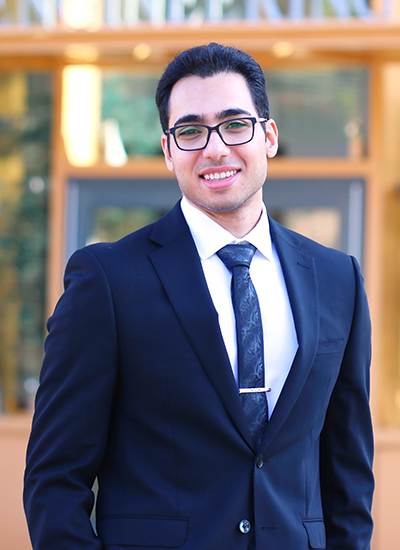
June 13, 2022 - Ramin Bostanabad, Samueli School assistant professor of mechanical and aerospace engineering, is one of 100 outstanding early career researchers selected to participate in the National Academy of Engineering’s (NAE) U.S. Frontiers of Engineering Symposium. The symposium will take place Sept. 21-23, 2022, at Amazon in Seattle.
The Frontiers of Engineering Symposium brings together a select group of engineers from all disciplines and from industry, academia, and federal labs to facilitate cross-disciplinary exchange and promote the transfer of new techniques and approaches across fields. The goal of the program is to sustain and build U.S. innovative capacity.
Bostanabad joined the Samueli School in the 2019-2020 academic year. His interdisciplinary research focuses on design under uncertainty, probabilistic machine learning, materials informatics, and computational mechanics.
“I enjoy integrating fields of knowledge that appear to be disjointed,” said Bostanabad. “For instance, I see remarkable resemblance between how my group does probabilistic multiscale simulations in metallic alloys and how climate models are designed to infuse regional details into largescale predictions over the entire globe. I believe such an ability will be beneficial to a symposium that hosts scholars with various fields of expertise.”
Bostanabad is especially excited for the opportunity to “converse on pressing topics such as climate change and fair AI, which affect the lives of millions.”
This year, the symposium will focus on new developments in four key areas of engineering research: Microbes - the Good, the Bad and the Ugly; Conversational AI; Technology and Racial Justice and Equity; and Hydrogen: A New Universal Energy Carrier for the Carbon-free Future. The last of these sessions will be co-chaired by Iryna Zenyuk, Samueli School associate professor of chemical and biomolecular engineering.
The NAE, part of the National Academies of Sciences, Engineering and Medicine, works to advance the welfare and prosperity of the nation by providing independent advice on matters involving engineering and technology, and by promoting a vibrant engineering profession and public appreciation of engineering.
- Rachel Karas
